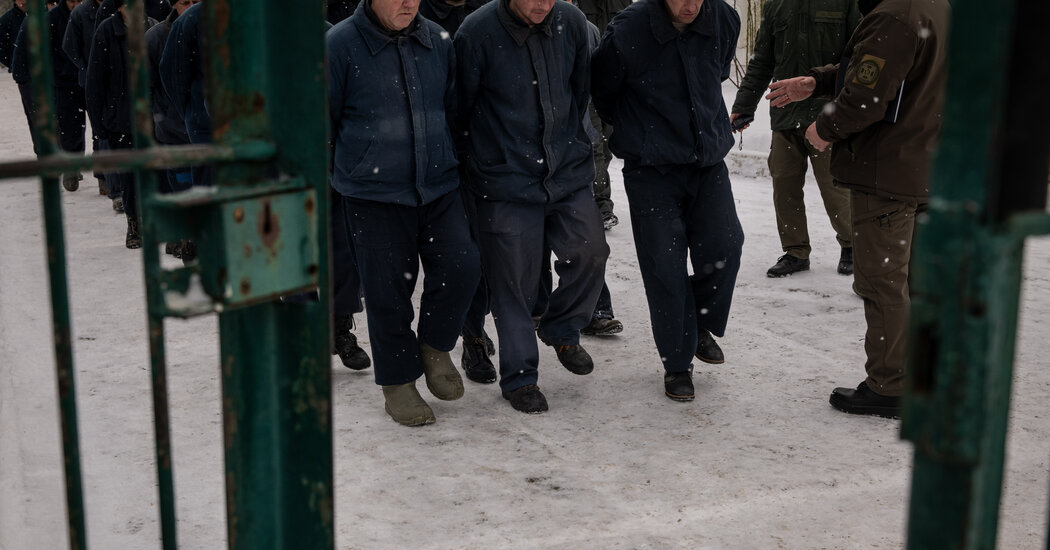In Russian prisons, they said they were deprived of effective treatments for their H.I.V. On the battlefield in Ukraine, they were offered hope, with the promise of anti-viral medications if they agreed to fight.
It was a recruiting pitch that worked for many Russian prisoners.
About 20 percent of recruits in Russian prisoner units are H.I.V. positive, Ukrainian authorities estimate based on infection rates in captured soldiers. Serving on the front lines seemed less risky than staying in prison, the detainees said in interviews with The New York Times.
“Conditions were very harsh” in Russian prison, said Timur, 37, an H.I.V.-positive Russian soldier interviewed at a detention site in the city of Dnipro in central Ukraine, and identified only by a first name, worried that he would face retaliation if he returned to Russia in a prisoner swap.
After he was sentenced to 10 years for drug dealing, the doctors in the Russian prison changed the anti-viral medication he had been taking to control H.I.V. to types he feared were not effective, Timur said.
Story continues below advertisement
Continue reading the main story
He said he did not think he could survive a decade in Russian prison with H.I.V. In December, he agreed to serve six months in the Wagner mercenary group in exchange for a pardon and supplies of anti-viral medications.
“I understood I would have a quick death or a slow death,” he said of choosing between poor H.I.V. treatment in prison and participating in assaults in Russia’s war in Ukraine. “I chose a quick death.”
Image
Timur had no military experience and was provided two weeks of training before deployment to the front, he said. He was issued a Kalashnikov rifle, 120 bullets, an armored vest and a helmet for the assault. Before sending the soldiers forward, he said, commanders “repeated many times, ‘if you try to leave this field, we will shoot you.’”
Soldiers in his platoon, he said, were sent on a risky assault, waves of soldiers with little chance of survival sent into battle on the outskirts of the eastern city of Bakhmut. Most were killed on their first day of combat. Timur was captured.
Story continues below advertisement
Continue reading the main story
Units of former prisoners have made up the bulk of forces in Russia’s attack on Bakhmut, one of the bloodiest and longest-running battles in the war. Beginning on a wide scale last summer, inmates were promised pardons for going into combat.

 www.nytimes.com
www.nytimes.com
It was a recruiting pitch that worked for many Russian prisoners.
About 20 percent of recruits in Russian prisoner units are H.I.V. positive, Ukrainian authorities estimate based on infection rates in captured soldiers. Serving on the front lines seemed less risky than staying in prison, the detainees said in interviews with The New York Times.
“Conditions were very harsh” in Russian prison, said Timur, 37, an H.I.V.-positive Russian soldier interviewed at a detention site in the city of Dnipro in central Ukraine, and identified only by a first name, worried that he would face retaliation if he returned to Russia in a prisoner swap.
After he was sentenced to 10 years for drug dealing, the doctors in the Russian prison changed the anti-viral medication he had been taking to control H.I.V. to types he feared were not effective, Timur said.
Story continues below advertisement
Continue reading the main story
He said he did not think he could survive a decade in Russian prison with H.I.V. In December, he agreed to serve six months in the Wagner mercenary group in exchange for a pardon and supplies of anti-viral medications.
“I understood I would have a quick death or a slow death,” he said of choosing between poor H.I.V. treatment in prison and participating in assaults in Russia’s war in Ukraine. “I chose a quick death.”
Image
Timur had no military experience and was provided two weeks of training before deployment to the front, he said. He was issued a Kalashnikov rifle, 120 bullets, an armored vest and a helmet for the assault. Before sending the soldiers forward, he said, commanders “repeated many times, ‘if you try to leave this field, we will shoot you.’”
Soldiers in his platoon, he said, were sent on a risky assault, waves of soldiers with little chance of survival sent into battle on the outskirts of the eastern city of Bakhmut. Most were killed on their first day of combat. Timur was captured.
Story continues below advertisement
Continue reading the main story
Units of former prisoners have made up the bulk of forces in Russia’s attack on Bakhmut, one of the bloodiest and longest-running battles in the war. Beginning on a wide scale last summer, inmates were promised pardons for going into combat.

‘A Quick Death or a Slow Death’: Prisoners Choose War to Get Lifesaving Drugs
An estimated 20 percent of Russia prisoner recruits are H.I.V. positive. To some, the front lines seemed less risky than prisons where they said they were denied effective treatments.

